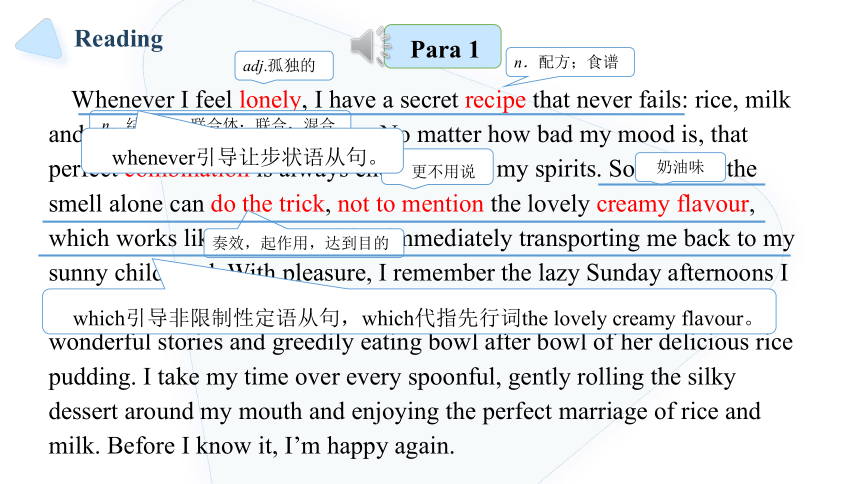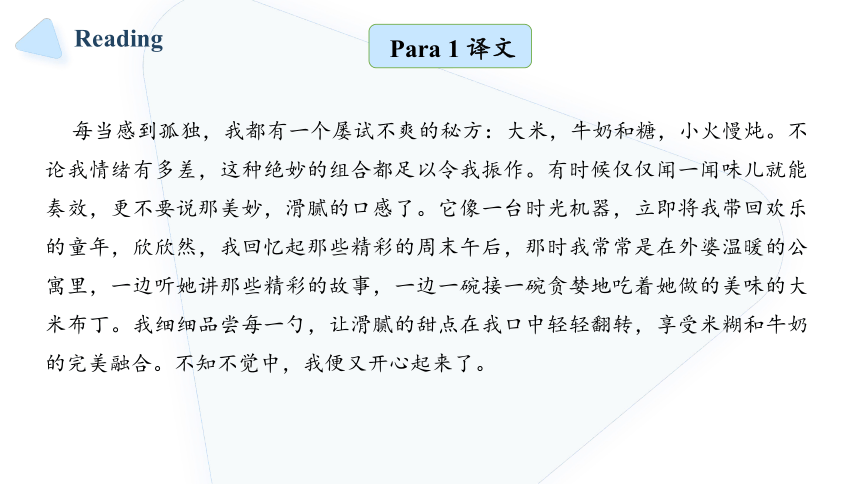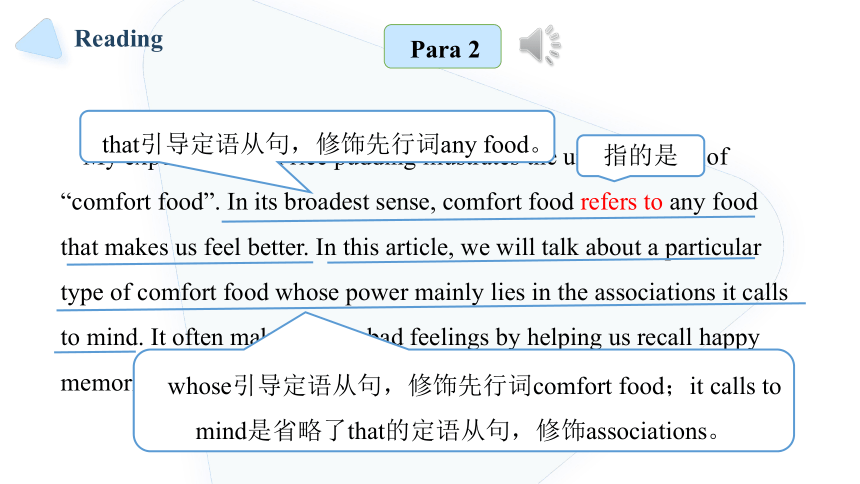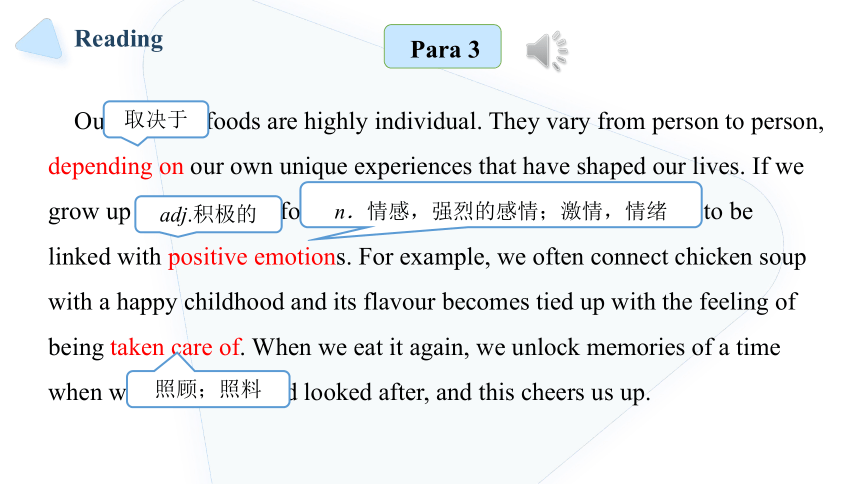牛津译林版(2020)选择性必修 第一册Unit 1 Food matters Reading课文预读课件 (19张ppt)
文档属性
| 名称 | 牛津译林版(2020)选择性必修 第一册Unit 1 Food matters Reading课文预读课件 (19张ppt) |

|
|
| 格式 | zip | ||
| 文件大小 | 12.1MB | ||
| 资源类型 | 教案 | ||
| 版本资源 | 牛津译林版(2019) | ||
| 科目 | 英语 | ||
| 更新时间 | 2021-11-26 00:00:00 | ||
图片预览







文档简介
(共19张PPT)
Unit 1 Food matters课文预读
comfort food课文预读
Reading
Whenever I feel lonely, I have a secret recipe that never fails: rice, milk and sugar, cooked low and slow. No matter how bad my mood is, that perfect combination is always enough to lift my spirits. Sometimes the smell alone can do the trick, not to mention the lovely creamy flavour, which works like a time machine immediately transporting me back to my sunny childhood. With pleasure, I remember the lazy Sunday afternoons I used to spend in the warmth of my grandma’s flat, listening to her wonderful stories and greedily eating bowl after bowl of her delicious rice pudding. I take my time over every spoonful, gently rolling the silky dessert around my mouth and enjoying the perfect marriage of rice and milk. Before I know it, I’m happy again.
Para 1
adj.孤独的
n.配方;食谱
n.结合体,联合体;联合,混合
奏效,起作用,达到目的
更不用说
奶油味
which引导非限制性定语从句,which代指先行词the lovely creamy flavour。
whenever引导让步状语从句。
Reading
每当感到孤独,我都有一个屡试不爽的秘方:大米,牛奶和糖,小火慢炖。不论我情绪有多差,这种绝妙的组合都足以令我振作。有时候仅仅闻一闻味儿就能奏效,更不要说那美妙,滑腻的口感了。它像一台时光机器,立即将我带回欢乐的童年,欣欣然,我回忆起那些精彩的周末午后,那时我常常是在外婆温暖的公寓里,一边听她讲那些精彩的故事,一边一碗接一碗贪婪地吃着她做的美味的大米布丁。我细细品尝每一勺,让滑腻的甜点在我口中轻轻翻转,享受米糊和牛奶的完美融合。不知不觉中,我便又开心起来了。
Para 1 译文
Reading
Para 2
My experience with rice pudding illustrates the unique power of “comfort food”. In its broadest sense, comfort food refers to any food that makes us feel better. In this article, we will talk about a particular type of comfort food whose power mainly lies in the associations it calls to mind. It often makes up for bad feelings by helping us recall happy memories of the people, things or places we love.
指的是
whose引导定语从句,修饰先行词comfort food;it calls to mind是省略了that的定语从句,修饰associations。
that引导定语从句,修饰先行词any food。
Reading
我关于大米布丁的经历说明了“治愈系食物”的独特力量。从广义上说,治愈系食物指的是任何能改善我们心情的食物。在本文里,我们要特别讲一类治愈系食物,它的力量主要在于它所唤起的联想。它常常通过帮助我们回忆起所爱之人、所爱之物、所爱之地的快乐往事,来消解不良情绪。
Para 2 译文
Reading
Para 3
Our comfort foods are highly individual. They vary from person to person, depending on our own unique experiences that have shaped our lives. If we grow up eating certain foods in our family, then those foods tend to be linked with positive emotions. For example, we often connect chicken soup with a happy childhood and its flavour becomes tied up with the feeling of being taken care of. When we eat it again, we unlock memories of a time when we were loved and looked after, and this cheers us up.
取决于
adj.积极的
n.情感,强烈的感情;激情,情绪
照顾;照料
Reading
治愈系食物相当个性化。它们由塑造我们人生的独特经历决定,因人而异。如果我们从小在家就吃某些特定的食物,这些食物就很容易与积极的情绪产生关联。比如,我们经常把鸡汤与快乐的童年联系在一起,它的味道与被关爱的感觉相关。当再次喝鸡汤时,我们解锁记忆,回想起受到疼爱与关怀的时光,这就会让我们的情绪变好。
Para 3 译文
Reading
Para 4
The feeling of happiness and sense of belonging can become particularly important for people who move away from their home country. According to some food experts, there are some aspects of culture that people will lose right away, but with food, there are more opportunities to connect to memory, family and place. It is hardest to give up the food that you grow up with. Of course, each person’s comfort food largely depends on where they come from—for a Chinese it might be a plate of dumplings with a saucer of vinegar, and for a native of the UK it might be the classic fish and chips, served hot, salty and sour. One mouthful of comfort food takes us back to our cultural roots, giving us the “taste of home” that we cry out for and relieving feelings of homesickness.
who引导定语从句,修饰先行词people。
where引导宾语从句,作depend on的宾语。
Reading
这种幸福感与归属感对于离开故国的人而言会变得尤为重要。据一些食物专家所言,文化中的某些方面人们很快会失去,但对于食物,则有更多机会与回忆、与家、与处所关联。从小到大的食物最难割舍。当然,每个人的治愈系食物(是什么)很大程度上取决于他们来自何方-----对一个中国人来说,可能是一盘饺子配上一碟醋;而对于一个土生土长的英国人来说,则可能是经典的炸鱼薯条,热腾腾地端上来,咸中带酸。一口治愈系食物带我们回到自己文化的根,带来我们渴望的“家的味道”,让我们一解怀乡之情。
Para 4 译文
Reading
Para 5
That’s certainly true for fort food tastes good and by building an emotional bond with our happy memories, always makes us feel good. It isn’t just a bowl of noodles or chicken soup. It’s food for the soul.
对我而言,的确如此。治愈系食物味道可口,通过与我们快乐的回忆之间建立情感联系,它让我们心情不错。它不仅仅是一碗面条或鸡汤,它是心灵的食量。
Eating in China课文预读
Reading
7 March,Sichuan hot pot 3月7日,四川火锅
The mouth-watering hot pots of Sichuan are as famous overseas as they are in China, and the hot flavour is enough to heat up a cold midwinter evening or to let loose rivers of sweat on a summer afternoon. I gave it my first try last night, together with a few local friends. As the soup bubbled slowly over a gas burner in the middle of the table, its surface was covered with a beautiful layer or chillies, Sichuan peppers, spring onions and red oil. Slowly at first, and then faster and faster, we tipped plates of fresh meat, fish and vegetables into the pot. The hot flavour quickened our laughter and conversation, making the meal the perfect way to relax with friends.
令人垂涎欲滴的四川火锅,闻名海内外,那火锅的风味足以温暖隆冬的寒夜,或在夏日的午后让人汗流如注。昨晚,我第一次尝试了四川火锅,是与几位当地的朋友一道吃的。桌子正中的煤气炉上,汤缓缓地冒着泡,表面覆盖着一层辣椒,花椒和红油,甚是好看。我们把一盘盘新鲜的肉、鱼和 菠菜倒进锅里,一开始慢,到后来越来越快,热辣的味道让大家谈笑起来更有兴致,这顿饭成了与友人放松的最佳方式。
Reading
7 March,Sichuan hot pot 3月7日,四川火锅
Sichuan hot pots are perfect for the damp, foggy climate in which they were invented. They are believed to have started off in the late Qing Dynasty as a way for boatmen on the Yangtze River to keep warm during the cold and wet winters. In the beginning, the delicious dish was made simply by boiling vegetables, chillies and Sichuan peppers in water. Over time, it has expanded to include multiple options of soups, vegetables, meats and sauces, appealing to people of different tastes. What I love best about Sichuan hot pots is that they offer a great opportunity to socialize with friends since a meal can last for hours. I instantly became a big fan of Sichuan hot pots and I’ll soon be back for more!
四川火锅非常适合其发源地潮湿多雾的气候。人们认为,火锅始自清末,当时是长江上的船工在湿冷的冬季取暖的一种方法。一开始,美味的火锅只不过是将菠菜、辣椒和花椒用水煮。后来,火锅的内容逐渐丰富,包括各式汤底以及品种多样的菠菜、肉和调料,满足了人们不同的口味。我最喜欢四川火锅的一点在于,它为朋友间的交往提供了很棒的机会,因为一顿饭能吃上好几个小时。我瞬间成了四川火锅的“铁杆粉丝”,我很快会再回来吃的。
Reading
12 August, Nanjing salted duck 8月12日,南京盐水鸭
Salted duck is Nanjing’s most famous food export. Several plain in thin, white slices, the meat is juicy and salty. Each Nanjing salted duck takes several days to prepare, and the process includes salting, drying, boiling and cooling. As I finished my first helping on a recent afternoon in Nanjing, my host, Chef Zhang, told me a little more about the dish.
盐水鸭是南京最有名的特色食品。鸭肉简单地切成白白的薄片,多汁带咸。每只盐水鸭都要经过腌、晾、煮、凉等工序,耗费数天制成。前几天下午,我在南京吃完我第一份盐水鸭后,做东的张大厨给我介绍了一下这道菜。
Reading
12 August, Nanjing salted duck 8月12日,南京盐水鸭
The countryside around Nanjing has been famous for its ducks for centuries; its countless waterways make the area perfect for raising waterbirds. A local history book from the late Qing Dynasty praised salted duck in particular, saying it was without equal. Traditionally, duck is considered to have cooling properties, so it is appropriate for the hot summer months. Nowadays, people eat salted duck all year round and it is estimated that tens of thousands of ducks are consumed every day in Nanjing! It definitely hit the spot when I tried it, and it has become one of my personal favourites.
南京周边的乡村因为鸭子已经驰名中外数百年,这一带水网密布,非常适合养殖水禽。一本清末的地方志尤其盛赞盐水鸭,称其无与伦比。传统上鸭肉被认为性凉,所以适宜在炎热的夏季食用。如今,人们一年四季都吃盐水鸭,据估计南京人每天要吃掉数万只鸭子!我一尝,它正对我胃口,盐水鸭已经成了我最钟爱的美食之一。
Reading
8 December, Cantonese dim sum 12月8日,广东点心
In Guangzhou, morning tea is such an essential part of the daily routine that “Have you had your tea ” has become the local version of “Good morning.” Though teahouses have been common in China since the Tang Dynasty, the Cantonese innovation of the mid-19th century was to serve tea together with a variety of light dishes, or dim sum. The concept took off, and today Guangzhou’s restaurants stimulate customers’ appetite with over a thousand offerings, each more delicate and delicious than the last.
在广东,早茶在日常生活中的地位是如此重要,以至于“饮茶未”(粤语,意为“你吃早茶了吗”-----译者注)成了当地人问候早安的方式。虽说茶馆在中国从唐代开始司空见惯了,但19世纪中叶广东人的创新在于将茶佐以各种小菜或点心。这种观念时兴起来,如今广州的餐厅用一千多道点心刺激着食客的食欲,一道比一道精致,可口。
Reading
8 December, Cantonese dim sum 12月8日,广东点心
The Cantonese do not hurry over their breakfast, as I found when I visited a restaurant in Guangzhou’s old city centre this morning, The emphasis is rather on conversation about business, family or pleasure, and locals can spend hours together chatting, drinking tea and working their way through the menu. From beef balls to rice noodle rolls, there are various dishes that have been baked, boiled, steamed or fried. A single visit is not enough to appreciate everything, and I have a long list of dim sum I still need to try.
广东人用早餐并不匆忙,正如今天早晨我在广东老城区中心的一家餐厅所见的那样,重点是谈生意,话家常、说乐子。当地人可以花上几个小时一起谈天,饮茶,慢慢吃遍菜单上所有的点心。从牛丸到肥肠,烤、煮、蒸、炸的菜品各式各样,来一次不足以尝个遍,我列出了一个长长的清单,都是以后要品尝的点心。
Thank You!
Unit 1 Food matters课文预读
comfort food课文预读
Reading
Whenever I feel lonely, I have a secret recipe that never fails: rice, milk and sugar, cooked low and slow. No matter how bad my mood is, that perfect combination is always enough to lift my spirits. Sometimes the smell alone can do the trick, not to mention the lovely creamy flavour, which works like a time machine immediately transporting me back to my sunny childhood. With pleasure, I remember the lazy Sunday afternoons I used to spend in the warmth of my grandma’s flat, listening to her wonderful stories and greedily eating bowl after bowl of her delicious rice pudding. I take my time over every spoonful, gently rolling the silky dessert around my mouth and enjoying the perfect marriage of rice and milk. Before I know it, I’m happy again.
Para 1
adj.孤独的
n.配方;食谱
n.结合体,联合体;联合,混合
奏效,起作用,达到目的
更不用说
奶油味
which引导非限制性定语从句,which代指先行词the lovely creamy flavour。
whenever引导让步状语从句。
Reading
每当感到孤独,我都有一个屡试不爽的秘方:大米,牛奶和糖,小火慢炖。不论我情绪有多差,这种绝妙的组合都足以令我振作。有时候仅仅闻一闻味儿就能奏效,更不要说那美妙,滑腻的口感了。它像一台时光机器,立即将我带回欢乐的童年,欣欣然,我回忆起那些精彩的周末午后,那时我常常是在外婆温暖的公寓里,一边听她讲那些精彩的故事,一边一碗接一碗贪婪地吃着她做的美味的大米布丁。我细细品尝每一勺,让滑腻的甜点在我口中轻轻翻转,享受米糊和牛奶的完美融合。不知不觉中,我便又开心起来了。
Para 1 译文
Reading
Para 2
My experience with rice pudding illustrates the unique power of “comfort food”. In its broadest sense, comfort food refers to any food that makes us feel better. In this article, we will talk about a particular type of comfort food whose power mainly lies in the associations it calls to mind. It often makes up for bad feelings by helping us recall happy memories of the people, things or places we love.
指的是
whose引导定语从句,修饰先行词comfort food;it calls to mind是省略了that的定语从句,修饰associations。
that引导定语从句,修饰先行词any food。
Reading
我关于大米布丁的经历说明了“治愈系食物”的独特力量。从广义上说,治愈系食物指的是任何能改善我们心情的食物。在本文里,我们要特别讲一类治愈系食物,它的力量主要在于它所唤起的联想。它常常通过帮助我们回忆起所爱之人、所爱之物、所爱之地的快乐往事,来消解不良情绪。
Para 2 译文
Reading
Para 3
Our comfort foods are highly individual. They vary from person to person, depending on our own unique experiences that have shaped our lives. If we grow up eating certain foods in our family, then those foods tend to be linked with positive emotions. For example, we often connect chicken soup with a happy childhood and its flavour becomes tied up with the feeling of being taken care of. When we eat it again, we unlock memories of a time when we were loved and looked after, and this cheers us up.
取决于
adj.积极的
n.情感,强烈的感情;激情,情绪
照顾;照料
Reading
治愈系食物相当个性化。它们由塑造我们人生的独特经历决定,因人而异。如果我们从小在家就吃某些特定的食物,这些食物就很容易与积极的情绪产生关联。比如,我们经常把鸡汤与快乐的童年联系在一起,它的味道与被关爱的感觉相关。当再次喝鸡汤时,我们解锁记忆,回想起受到疼爱与关怀的时光,这就会让我们的情绪变好。
Para 3 译文
Reading
Para 4
The feeling of happiness and sense of belonging can become particularly important for people who move away from their home country. According to some food experts, there are some aspects of culture that people will lose right away, but with food, there are more opportunities to connect to memory, family and place. It is hardest to give up the food that you grow up with. Of course, each person’s comfort food largely depends on where they come from—for a Chinese it might be a plate of dumplings with a saucer of vinegar, and for a native of the UK it might be the classic fish and chips, served hot, salty and sour. One mouthful of comfort food takes us back to our cultural roots, giving us the “taste of home” that we cry out for and relieving feelings of homesickness.
who引导定语从句,修饰先行词people。
where引导宾语从句,作depend on的宾语。
Reading
这种幸福感与归属感对于离开故国的人而言会变得尤为重要。据一些食物专家所言,文化中的某些方面人们很快会失去,但对于食物,则有更多机会与回忆、与家、与处所关联。从小到大的食物最难割舍。当然,每个人的治愈系食物(是什么)很大程度上取决于他们来自何方-----对一个中国人来说,可能是一盘饺子配上一碟醋;而对于一个土生土长的英国人来说,则可能是经典的炸鱼薯条,热腾腾地端上来,咸中带酸。一口治愈系食物带我们回到自己文化的根,带来我们渴望的“家的味道”,让我们一解怀乡之情。
Para 4 译文
Reading
Para 5
That’s certainly true for fort food tastes good and by building an emotional bond with our happy memories, always makes us feel good. It isn’t just a bowl of noodles or chicken soup. It’s food for the soul.
对我而言,的确如此。治愈系食物味道可口,通过与我们快乐的回忆之间建立情感联系,它让我们心情不错。它不仅仅是一碗面条或鸡汤,它是心灵的食量。
Eating in China课文预读
Reading
7 March,Sichuan hot pot 3月7日,四川火锅
The mouth-watering hot pots of Sichuan are as famous overseas as they are in China, and the hot flavour is enough to heat up a cold midwinter evening or to let loose rivers of sweat on a summer afternoon. I gave it my first try last night, together with a few local friends. As the soup bubbled slowly over a gas burner in the middle of the table, its surface was covered with a beautiful layer or chillies, Sichuan peppers, spring onions and red oil. Slowly at first, and then faster and faster, we tipped plates of fresh meat, fish and vegetables into the pot. The hot flavour quickened our laughter and conversation, making the meal the perfect way to relax with friends.
令人垂涎欲滴的四川火锅,闻名海内外,那火锅的风味足以温暖隆冬的寒夜,或在夏日的午后让人汗流如注。昨晚,我第一次尝试了四川火锅,是与几位当地的朋友一道吃的。桌子正中的煤气炉上,汤缓缓地冒着泡,表面覆盖着一层辣椒,花椒和红油,甚是好看。我们把一盘盘新鲜的肉、鱼和 菠菜倒进锅里,一开始慢,到后来越来越快,热辣的味道让大家谈笑起来更有兴致,这顿饭成了与友人放松的最佳方式。
Reading
7 March,Sichuan hot pot 3月7日,四川火锅
Sichuan hot pots are perfect for the damp, foggy climate in which they were invented. They are believed to have started off in the late Qing Dynasty as a way for boatmen on the Yangtze River to keep warm during the cold and wet winters. In the beginning, the delicious dish was made simply by boiling vegetables, chillies and Sichuan peppers in water. Over time, it has expanded to include multiple options of soups, vegetables, meats and sauces, appealing to people of different tastes. What I love best about Sichuan hot pots is that they offer a great opportunity to socialize with friends since a meal can last for hours. I instantly became a big fan of Sichuan hot pots and I’ll soon be back for more!
四川火锅非常适合其发源地潮湿多雾的气候。人们认为,火锅始自清末,当时是长江上的船工在湿冷的冬季取暖的一种方法。一开始,美味的火锅只不过是将菠菜、辣椒和花椒用水煮。后来,火锅的内容逐渐丰富,包括各式汤底以及品种多样的菠菜、肉和调料,满足了人们不同的口味。我最喜欢四川火锅的一点在于,它为朋友间的交往提供了很棒的机会,因为一顿饭能吃上好几个小时。我瞬间成了四川火锅的“铁杆粉丝”,我很快会再回来吃的。
Reading
12 August, Nanjing salted duck 8月12日,南京盐水鸭
Salted duck is Nanjing’s most famous food export. Several plain in thin, white slices, the meat is juicy and salty. Each Nanjing salted duck takes several days to prepare, and the process includes salting, drying, boiling and cooling. As I finished my first helping on a recent afternoon in Nanjing, my host, Chef Zhang, told me a little more about the dish.
盐水鸭是南京最有名的特色食品。鸭肉简单地切成白白的薄片,多汁带咸。每只盐水鸭都要经过腌、晾、煮、凉等工序,耗费数天制成。前几天下午,我在南京吃完我第一份盐水鸭后,做东的张大厨给我介绍了一下这道菜。
Reading
12 August, Nanjing salted duck 8月12日,南京盐水鸭
The countryside around Nanjing has been famous for its ducks for centuries; its countless waterways make the area perfect for raising waterbirds. A local history book from the late Qing Dynasty praised salted duck in particular, saying it was without equal. Traditionally, duck is considered to have cooling properties, so it is appropriate for the hot summer months. Nowadays, people eat salted duck all year round and it is estimated that tens of thousands of ducks are consumed every day in Nanjing! It definitely hit the spot when I tried it, and it has become one of my personal favourites.
南京周边的乡村因为鸭子已经驰名中外数百年,这一带水网密布,非常适合养殖水禽。一本清末的地方志尤其盛赞盐水鸭,称其无与伦比。传统上鸭肉被认为性凉,所以适宜在炎热的夏季食用。如今,人们一年四季都吃盐水鸭,据估计南京人每天要吃掉数万只鸭子!我一尝,它正对我胃口,盐水鸭已经成了我最钟爱的美食之一。
Reading
8 December, Cantonese dim sum 12月8日,广东点心
In Guangzhou, morning tea is such an essential part of the daily routine that “Have you had your tea ” has become the local version of “Good morning.” Though teahouses have been common in China since the Tang Dynasty, the Cantonese innovation of the mid-19th century was to serve tea together with a variety of light dishes, or dim sum. The concept took off, and today Guangzhou’s restaurants stimulate customers’ appetite with over a thousand offerings, each more delicate and delicious than the last.
在广东,早茶在日常生活中的地位是如此重要,以至于“饮茶未”(粤语,意为“你吃早茶了吗”-----译者注)成了当地人问候早安的方式。虽说茶馆在中国从唐代开始司空见惯了,但19世纪中叶广东人的创新在于将茶佐以各种小菜或点心。这种观念时兴起来,如今广州的餐厅用一千多道点心刺激着食客的食欲,一道比一道精致,可口。
Reading
8 December, Cantonese dim sum 12月8日,广东点心
The Cantonese do not hurry over their breakfast, as I found when I visited a restaurant in Guangzhou’s old city centre this morning, The emphasis is rather on conversation about business, family or pleasure, and locals can spend hours together chatting, drinking tea and working their way through the menu. From beef balls to rice noodle rolls, there are various dishes that have been baked, boiled, steamed or fried. A single visit is not enough to appreciate everything, and I have a long list of dim sum I still need to try.
广东人用早餐并不匆忙,正如今天早晨我在广东老城区中心的一家餐厅所见的那样,重点是谈生意,话家常、说乐子。当地人可以花上几个小时一起谈天,饮茶,慢慢吃遍菜单上所有的点心。从牛丸到肥肠,烤、煮、蒸、炸的菜品各式各样,来一次不足以尝个遍,我列出了一个长长的清单,都是以后要品尝的点心。
Thank You!
同课章节目录
- Unit 1 Food matters
- Welcome to the unit
- Reading
- Grammar and usage
- Integrated skills
- Extended reading
- Project
- Unit 2 The Universal Language
- Welcome to the unit
- Reading
- Grammar and usage
- Integrated skills
- Extended reading
- Project
- Unit 3 The art of painting
- Welcome to the unit
- Reading
- Grammar and usage
- Integrated skills
- Extended reading
- Project
- Unit 4 Exploring poetry
- Welcome to the unit
- Reading
- Grammar and usage
- Integrated skills
- Extended reading
- Project
